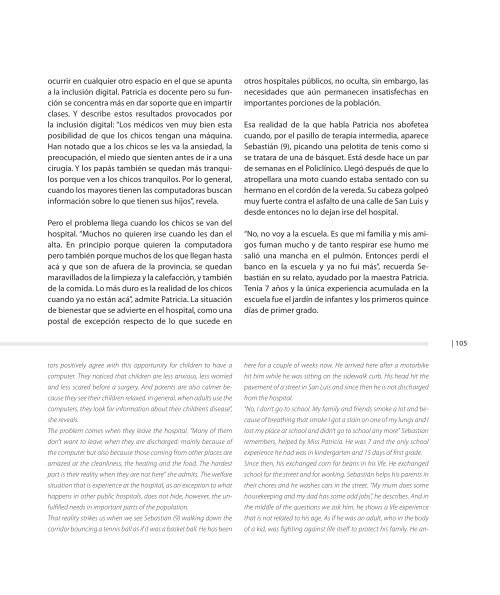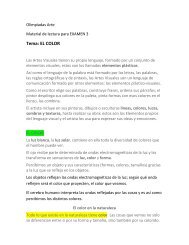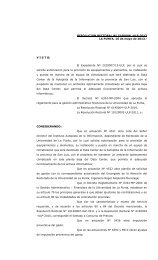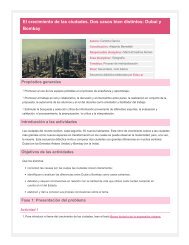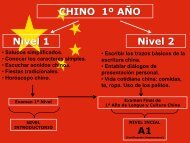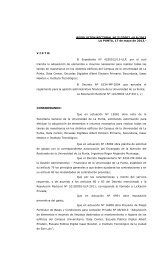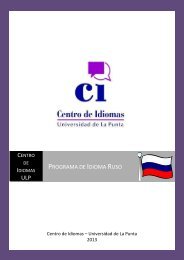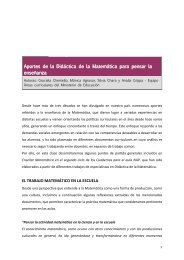otra vez, que es el típico hospital público pero no loes. Es que hasta aquí llegan los principios <strong>de</strong>l programaTodos los Chicos en la Red. Es <strong>de</strong>cir, hay en este lugar suficientescomputadoras como para que los niños y adolescentesinternados y sus papás puedan seguir tomandoclases cuando <strong>de</strong>ben permanecer mucho tiempo enel hospital. O para entretenerse cuando las internacionesson cortas. O cuando los papás necesitan enten<strong>de</strong>ralgo más cuando les explican cuál es el diagnóstico <strong>de</strong>la dolencia <strong>de</strong> su hijo.Nos recibe Patricia Ortiz (34), una maestra que parecemás joven que los años que <strong>de</strong>clara, tal vez porque lapersonalidad que refleja es alegre, vivaz, una <strong>de</strong> esas“buenas conversadoras” como suelen <strong>de</strong>cir en los pueblos.Está a cargo <strong>de</strong> la iniciativa <strong>de</strong> la <strong>ULP</strong> en el PoliclínicoRegional, aunque su tarea parece apuntar más ala contención que a los preceptos pedagógicos. Patriciaparece una versión “informática” <strong>de</strong> Hunter “Patch”Adams, ese médico estadouni<strong>de</strong>nse que encarnó RobinWilliams en una exitosa película <strong>de</strong> Hollywood, inventor<strong>de</strong> la risoterapia con fines médicos y terapéuticos.“Tengo un carrito <strong>de</strong> supermercados don<strong>de</strong> todas lasmañanas cargo las 33 computadoras disponibles ylas reparto. Le pongo una mesita a cada paciente. Loschicos internados tienen siempre una máquina y si sobranalgunas se las damos a los papás. <strong>La</strong>s reparto porla mañana, <strong>de</strong>spués <strong>de</strong>l <strong>de</strong>sayuno y la revisión médica.Lo que más hacen los chicos cuando están acá es jugarporque por lo general permanecen internados entretres y cuatro días”, <strong>de</strong>scribe la mentora, que el día <strong>de</strong>nuestra visita repartió 14 computadoras en las salas. Encada una <strong>de</strong> ellas hay tres niños o adolescentes.Esta situación es la que, por lo general, ocurre en elárea <strong>de</strong> terapia intensiva e intermedia <strong>de</strong> pediatría.Está claro que el objetivo es, al igual que en cualquierotro lugar <strong>de</strong> San Luis, que los chicos aprendan a manejarla máquina y a buscar en Internet. El panoramacambia cuando hay internaciones más largas. En esecaso, Patricia cumple a rajatabla el reemplazo escolar.Se hacen los <strong>de</strong>beres, se estudia, se toman exámenes.El trabajo, pese a lo que significa estar en un hospital,se advierte mucho más relajado que lo que pue<strong>de</strong>104 |the All Kids online program is present. There enough computers herefor children and teenagers inpatients to keep up with their classeseven if they have to be at the hospital for a long time. Or computerscan be also used for entertainment when inpatients stay for shorterperiods. They are also available for parents who want to un<strong>de</strong>rstandmore when doctors explain the diagnosis of their children’s disease.Patricia Ortiz (34) welcomes us. She looks way younger than her actualage, perhaps due to her cheerful and lively personality, a “goodtalker” as they say in small towns. She is in charge of the University’sinitiative at the Regional Hospital, although her job seems more relatedto providing emotional support than to pedagogical precepts.Patricia looks like an informatics version of Hunter “Patch” Adams,that American doctor played by Robin Williams in a successful Hollywoodmovie, who also invented the “laugh therapy” with therapeuticand medical purposes.“I have a supermarket cart that every morning I load with 33 computersand hand them in. I put a table to each patient. Inpatientsalways have a computer and if there are some extra ones, we givethem to parents. I hand them in during the morning, after breakfastand the doctor’s control. Children here mostly play with computers,they are usually no longer that 3 to 4 days” she <strong>de</strong>scribes and tellsus that on the day of our visit she han<strong>de</strong>d in 14 computers. In eachroom, there are three children or teenagers.This is the typical situation at the IC unit in the Pediatric area. Clearly,the objective is the same, children have to learn to use the computerand look for things on the internet. The perspective changes wheninpatients stay longer. In that case, Patricia substitutes the schoolteacher. Inpatients do homework, study and have exams.This job is more relaxed here, <strong>de</strong>spite being in a hospital, than in anyother space where digital inclusion is the goal. Patricia is a teacher,but her role is more related to providing support than to teaching.She <strong>de</strong>scribes the results obtained thanks to digital inclusion: “Doc-
ocurrir en cualquier otro espacio en el que se apuntaa la inclusión digital. Patricia es docente pero su funciónse concentra más en dar soporte que en impartirclases. Y <strong>de</strong>scribe estos resultados provocados porla inclusión digital: “Los médicos ven muy bien estaposibilidad <strong>de</strong> que los chicos tengan una máquina.Han notado que a los chicos se les va la ansiedad, lapreocupación, el miedo que sienten antes <strong>de</strong> ir a unacirugía. Y los papás también se quedan más tranquilosporque ven a los chicos tranquilos. Por lo general,cuando los mayores tienen las computadoras buscaninformación sobre lo que tienen sus hijos”, revela.Pero el problema llega cuando los chicos se van <strong>de</strong>lhospital. “Muchos no quieren irse cuando les dan elalta. En principio porque quieren la computadorapero también porque muchos <strong>de</strong> los que llegan hastaacá y que son <strong>de</strong> afuera <strong>de</strong> la provincia, se quedanmaravillados <strong>de</strong> la limpieza y la calefacción, y también<strong>de</strong> la comida. Lo más duro es la realidad <strong>de</strong> los chicoscuando ya no están acá”, admite Patricia. <strong>La</strong> situación<strong>de</strong> bienestar que se advierte en el hospital, como unapostal <strong>de</strong> excepción respecto <strong>de</strong> lo que suce<strong>de</strong> enotros hospitales públicos, no oculta, sin embargo, lasnecesida<strong>de</strong>s que aún permanecen insatisfechas enimportantes porciones <strong>de</strong> la población.Esa realidad <strong>de</strong> la que habla Patricia nos abofeteacuando, por el pasillo <strong>de</strong> terapia intermedia, apareceSebastián (9), picando una pelotita <strong>de</strong> tenis como sise tratara <strong>de</strong> una <strong>de</strong> básquet. Está <strong>de</strong>s<strong>de</strong> hace un par<strong>de</strong> semanas en el Policlínico. Llegó <strong>de</strong>spués <strong>de</strong> que loatropellara una moto cuando estaba sentado con suhermano en el cordón <strong>de</strong> la vereda. Su cabeza golpeómuy fuerte contra el asfalto <strong>de</strong> una calle <strong>de</strong> San Luis y<strong>de</strong>s<strong>de</strong> entonces no lo <strong>de</strong>jan irse <strong>de</strong>l hospital.“No, no voy a la escuela. Es que mi familia y mis amigosfuman mucho y <strong>de</strong> tanto respirar ese humo mesalió una mancha en el pulmón. Entonces perdí elbanco en la escuela y ya no fui más”, recuerda Sebastiánen su relato, ayudado por la maestra Patricia.Tenía 7 años y la única experiencia acumulada en laescuela fue el jardín <strong>de</strong> infantes y los primeros quincedías <strong>de</strong> primer grado.| 105tors positively agree with this opportunity for children to have acomputer. They noticed that children are less anxious, less worriedand less scared before a surgery. And parents are also calmer becausethey see their children relaxed. In general, when adults use thecomputers, they look for information about their children’s disease”,she reveals.The problem comes when they leave the hospital. “Many of themdon’t want to leave when they are discharged: mainly because ofthe computer but also because those coming from other places areamazed at the cleanliness, the heating and the food. The har<strong>de</strong>stpart is their reality when they are not here” she admits. The welfaresituation that is experience at the hospital, as an exception to whathappens in other public hospitals, does not hi<strong>de</strong>, however, the unfulfilledneeds in important parts of the population.That reality strikes us when we see Sebastian (9) walking down thecorridor bouncing a tennis ball as if it was a basket ball. He has beenhere for a couple of weeks now. He arrived here after a motorbikehit him while he was sitting on the si<strong>de</strong>walk curb. His head hit thepavement of a street in San Luis and since then he is not dischargedfrom the hospital.“No, I don’t go to school. My family and friends smoke a lot and becauseof breathing that smoke I got a stain on one of my lungs and Ilost my place at school and didn’t go to school any more” Sebastianremembers, helped by Miss Patricia. He was 7 and the only schoolexperience he had was in kin<strong>de</strong>rgarten and 15 days of first gra<strong>de</strong>.Since then, his exchanged corn for beans in his life. He exchangedschool for the street and for working. Sebastián helps his parents intheir chores and he washes cars in the street. “My mum does somehousekeeping and my dad has some odd jobs”, he <strong>de</strong>scribes. And inthe middle of the questions we ask him, he shows a life experiencethat is not related to his age. As if he was an adult, who in the bodyof a kid, was fighting against life itself to protect his family. He an-
- Page 3 and 4:
»InitiativesHistorias de San Luis
- Page 5:
»Historiasde San Luis DigitalIniti
- Page 8 and 9:
Con estos antecedentes y una serie
- Page 10 and 11:
El Gobierno de San Luis previó est
- Page 13:
»ÍndiceIntroducciónCapítulo I -
- Page 16 and 17:
14 |Campus Universidad de La Punta
- Page 18 and 19:
El presente libro registra voces de
- Page 20 and 21:
Escuela provincial N° 192 “Maest
- Page 22 and 23:
producciones de alfa, omega, epsil
- Page 24 and 25:
piden la proyección de películas
- Page 26 and 27:
para llegar a Buenos Aires y estar
- Page 28 and 29:
en una fábrica. Ahora, con la ‘c
- Page 30 and 31:
de cada provincia. La de San Luis v
- Page 32 and 33:
A diferencia de la escuela de Donov
- Page 34 and 35:
Escuela Nº 267 “Gobernador Eribe
- Page 36 and 37:
Esta docente también dicta clases
- Page 38 and 39:
Escuela Nº 267 “Gobernador Eribe
- Page 40 and 41:
“Los chicos ya saben más que yo
- Page 42 and 43:
“Cada docente tiene libertad para
- Page 44 and 45:
para que los chicos puedan hacer tr
- Page 46 and 47:
más de contemplar la meta de ofrec
- Page 48 and 49:
en un horario preacordado en forma
- Page 50 and 51:
mera obligación, terminará, y ent
- Page 52 and 53:
1º del Polimodal (hoy 3º año)”
- Page 54 and 55:
comenzar a trabajar rápidamente. D
- Page 56 and 57: y trabajando en Piedra Bola y viaja
- Page 58 and 59: distancia no existe porque todo va
- Page 60 and 61: des que, sin rodeos, relata: “Est
- Page 62 and 63: e cómo buscar más material cuando
- Page 64 and 65: Plan de Inclusión Social (plan soc
- Page 66 and 67: Centro de Inclusión Digital de El
- Page 68 and 69: Claro que lo que sucede en el marco
- Page 70 and 71: signas”, pero busca superar esas
- Page 72 and 73: situación de vida, se atrevieron a
- Page 74 and 75: porque dicen que, así, no me quedo
- Page 76 and 77: La introducción de herramientas di
- Page 78 and 79: “Trabajamos con los profesores, c
- Page 80 and 81: su compresión más sencilla. Se tr
- Page 83 and 84: »Capítulo IVTalleres de arte, jue
- Page 85 and 86: Escuela 145 “Patricio Guanca” /
- Page 87 and 88: alcanzar un objetivo les impide pro
- Page 89 and 90: Natalia Miranda (12) es otra de las
- Page 91: tengan mejores condiciones de vida,
- Page 94 and 95: mas libres que, cuando terminan de
- Page 96 and 97: La aspiración de Ester es “apren
- Page 98: “Hace un año y medio que estoy e
- Page 101 and 102: tra pero dejé para poder dedicarme
- Page 103: en computadoras y arrancó con inge
- Page 108 and 109: Policlínico Regional de San Luis /
- Page 110 and 111: Desde una habitación vecina, Lucas
- Page 112 and 113: En el medio de estos dos grandes se
- Page 114 and 115: 112 |22 de agosto de 2008 - Entrega
- Page 116 and 117: plementa con servicios gratuitos de
- Page 119 and 120: »Capítulo XIConcluciones“Yo ten
- Page 121 and 122: Oportunidad y cambio son dos palabr


